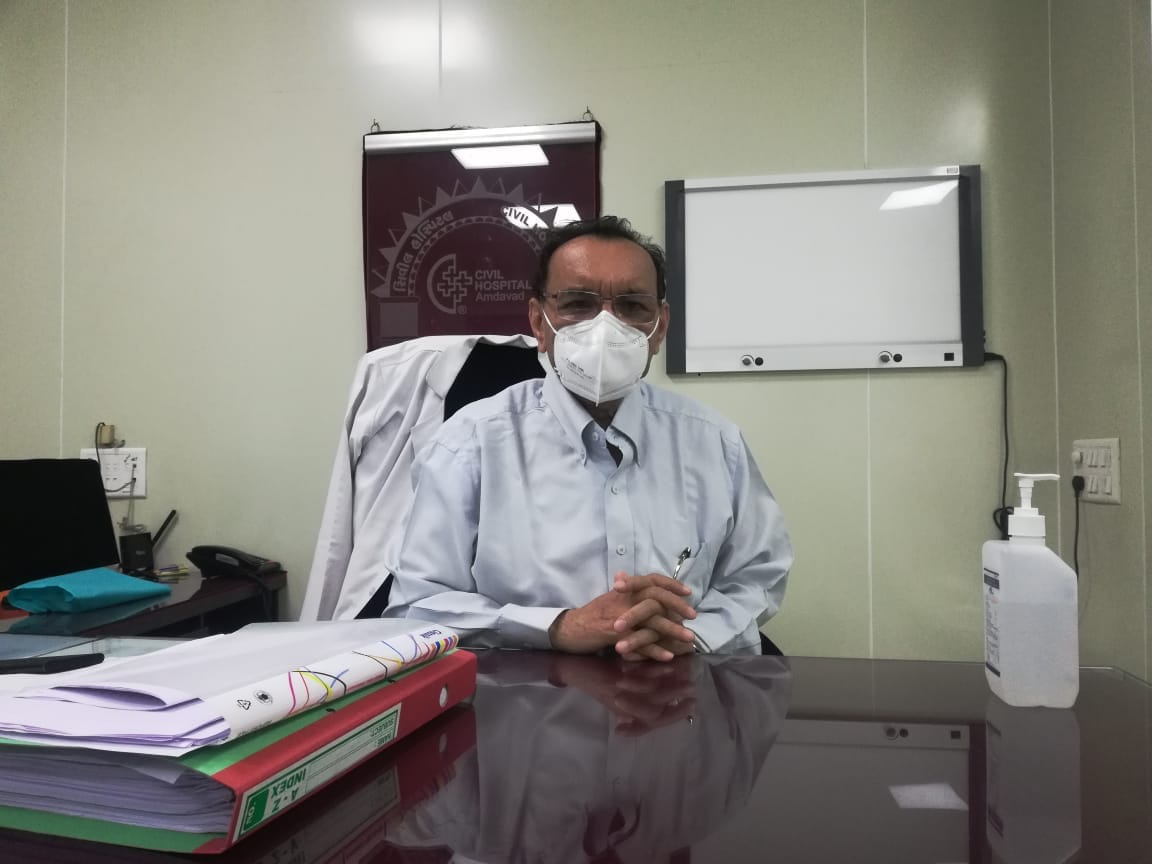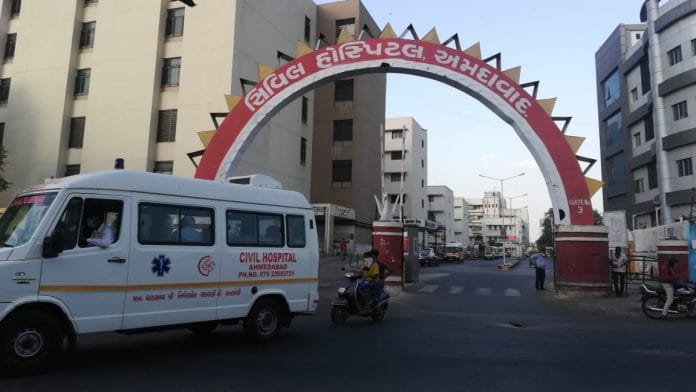Ahmedabad, Delhi: On 4 June, Samir Khan, a builder residing in Juhapura locality of Ahmedabad, began searching for a hospital bed for his 75-year-old diabetic father who was suspected of being Covid-positive.
After four government hospitals in Ahmedabad turned him away, Khan finally managed to secure a bed for his father at the Gujarat Cancer Research Institute.
But two days later, on the night of 6 June, Khan’s father, who in the interim tested positive for Covid-19, succumbed to the virus. The builder blames the death on the delay in treatment caused by the fact he had to shuttle his father from one hospital to another.
His ordeal is also emblematic of the extent of the Covid-19 pandemic in Ahmedabad, the country’s worst affected city, where spiralling cases have left patients struggling to secure beds in Covid-designated hospitals.
Khan’s father had been admitted in a private hospital on 3 June but the management there wanted him shifted out because his oxygen saturation level had dropped and he was suspected of having Covid-19.
The builder says four of the government hospitals — the Asarwa Government Hospital, Sola Civil Hospital, the Ahmedabad Civil Hospital and the Sardar Vallabhbhai Patel (SVP) Institute of Medical Sciences — had no beds at all.
He also alleged that at SVP, the doctor in charge asked him to sign a document, which stated that the hospital was short of ventilators and would not take responsibility for his father’s health. Khan says he refused to sign the document.
ThePrint contacted the superintendent of SVP hospital, Dr. S.T. Malhan, through calls and text but did not get a response.
This lack of beds, coupled with a large number of patients with comorbidities such as diabetes and high blood pressure, and patients landing up in hospitals at an advanced stage have together resulted in Ahmedabad dealing with the highest fatality rate in the country.
Also read: 2 members of Ahmedabad family ‘die of breathlessness’, but hospital doesn’t give Covid reports
A deadly city
As of 12 June, Ahmedabad had 22,032 cases of the confirmed cases in Gujarat, which ranks fourth after Maharashtra, Tamil Nadu and Delhi in overall Covid-19 tally.
But where Ahmedabad’s numbers are really startling is in the death rates.
Gujarat has the highest case fatality rate in the country at 6.2 per cent, more than twice the national average of 2.8 per cent.
But most of Gujarat’s 1,385 deaths have occurred in Ahmedabad; the city has recorded 1,117 deaths, over 80 per cent of the state’s tally.
Its case fatality rate is even higher at 7.1 per cent.
What’s worse is that the city’s deaths per million is the highest in the country. As of 6 June, Ahmedabad had 128 deaths per million, far ahead of Mumbai in second place, the city with the highest cases but deaths at 113 per million.
That has put the spotlight firmly on the Gujarat government’s handling of the crisis, particularly in Ahmedabad.
The state high Court as well as critics and experts have panned the containment efforts in the city. Ahmedabad failed to implement basic containment policies and the ill-preparedness of civil authorities has exacerbated the problem and weakened the state response, said an analysis by think tank Observer Research Foundation.
The Gujarat High Court had on 24 May called the Ahmedabad Civil Hospital, the state-run hospital that has the highest caseload, a “dungeon”.
The hospital has also frequently courted controversies — from the purchase of 900 uncertified ventilators, alleged mismanagement of beds and even poor communication with patients and their relatives.
But Dr M.M. Prabhakaran, officer on special duty, Ahmedabad Civil Hospital, blamed the hospital’s numbers on the nature of the cases.
“We are seeing the most severe cases who do not get admission anywhere else, so our numbers and deaths are higher,” said Dr Prabhakaran, adding that the hospital has adequate staff and facilities to take care of all its patients.

Patients coming in late, advanced disease, late diagnosis
The state has been struggling to determine the reasons for its high death rate.
A government-appointed expert committee, formed to understand the high mortality figures, had in a press conference on 7 June, said there was no clear reason for the high number of deaths.
But Gujarat Health Secretary Jayanti Ravi said at the press conference that over 84 per cent of the deaths were in the high-risk category, which is of those of above 60 years or below 10 years and many with co-morbidities like diabetes, high blood pressure, among others. She also blamed late admission to the hospital for the high number of deaths.
Her views were echoed by Dr Dileep Malvankar, director, Indian Institute of Public Health (IIPH) and a member of the state’s Covid-19 task-force.
“There is a higher incidence of obesity, diabetes, hypertension and anaemia in Gujarat than in other regions,” Malvankar said.
Earlier authorities had blamed the ‘L’ strain of coronavirus that was predominant in Gujarat and also found in Wuhan, China, for the higher mortality. However, there has been no evidence that different strains affect disease fatality.
The state is also drawing allegations of a cover-up, especially since the abrupt transfer of Municipal Commissioner Vijay Nehra on 18 May.
Since the transfer, there has been a selective flow of information trickling to the public, alleged Mujahid Nafees, convenor of the city Minority Coordination Committee.
“The ward-wise data distribution has stopped, and now even the total number of cases are not shown in the daily bulletin,” Nafees said. “Only an active number of cases are shown and the daily press briefings have stopped.”
Also read: Ram Guha’s tweet about ‘culturally backward’ Gujarat unites BJP and Congress
Testing bottleneck that has caused inordinate delays
The problem has been compounded by testing figures.
Gujarat has tested 2.61 lakh samples as of 10 June, which at 3,802 tests per million is much lower than Maharashtra (4,702), Delhi (12,989) and Tamil Nadu (8,173) — the three other worst-affected states.
Gujarat’s positivity rate of 8 per cent, double of India’s, is an indicator that only the most symptomatic are getting tested.
“Increasing the number of tests even by 30 per cent will not make a big difference,” said Malvankar. That will mean we will pick more mild cases who will recover and then mortality will look lower but not as drastically to match the national average, he added.
Another aspect that has now come under the scanner is the state’s testing guidelines.
In May, the Gujarat Health Department allowed private laboratories to test patients who were undergoing medical procedures but there was a catch — before testing any patient, the labs would need the approval of the chief district health officer or the medical officer of health.
In Ahmedabad, that meant getting approval from Sola Civil Hospital’s medical superintendent.
On 29 May, the Gujarat High Court hearing a suo motu PIL, ordered that the doctors would not require an approval from the authorities and would only need to intimate them.
The delay in getting approvals and the confusion over who to get approvals from meant the family members of the infected persons would have turned super-spreaders, said Dr Bharat Gadhavi, president of Ahmedabad Hospitals and Nursing Association.
The backlog created enormous problems for patients who had been waiting for surgeries and treatment.
Cancer patients are already immunocompromised and they need to be tested for Covid-19 since their mortality and morbidity is 20-30 per cent if they are positive, said Dr Viren Shah, an oncosurgeon.
Also not knowing the Covid-19 status meant an added risk for healthcare workers. About 200 doctors have tested positive and four have died in the city.
But the court order, stakeholders say, has improved the situation.
“Things have improved since the high court order. We had to wait 3-4 days for the approval to test symptomatic patients we had; now we don’t need an approval, we just need to write an email,” said a director of a private designated Covid-19 hospital.
“We have tested 15-20 of our patients in the last three days, which would have taken a week otherwise.”
This is also not without caveats, any symptomatic patient who would want to be tested, will need to get admitted in the private hospital and then get tested, said Dr Manish Kumar, special officer on duty, Ahmedabad Municipal Corporation, similar to the procedure for individuals who are referred from the government facilities for testing and kept in Covid suspect ward until their results come.
Private players brought in too late
The state government had also been slow in seeking the help of private hospitals, especially in Ahmedabad. It was only on 15 May that the Ahmedabad Municipal Corporation enlisted 42 private hospitals to treat Covid-19 patients. This number has now increased to 60.
These hospitals have allocated 50 per cent of their beds for patients referred from the civic body. This has now led to an increase in the bed capacity from about an earlier 1,000 to now 3,000, said Kumar, the special officer on duty, Ahmedabad Municipal Corporation.
There are already 750 patients seeking care in the AMC beds in these hospitals, Kumar told ThePrint.
But with cases rising, even the private hospitals are facing the heat.
On 1 June, when ThePrint reached a private hospital at Juhapura, which had just gotten permission to be a designated Covid hospital, all of its 50 beds were full.
Outside the hospital, ThePrint found a 60-year-old lying on her back in a tempo, gasping for breath while her relatives surrounded her. “There are no beds in the hospital, we have been waiting here for an hour,” said one of her relatives.
The CEO of the hospital told ThePrint that they have had no choice but to send patients away. “Everyday we have 2-3 deaths of patients, mostly because their oxygen saturation levels were already too low and they could not be saved,” the CEO said.
Patients being turned away from hospitals is routine, said Mirza Haji Asrar Baig, the Congress corporator from Juhapura, who says he fields desperate calls from patients seeking beds.
Despite the clear need for more beds, the administration has still not opened the 700-bedded V.S. Hospital, which is in the same campus as SVP hospital despite Gujarat High court’s suggestions, he said.
The AMC has said that it does not have the adequate staff to start operations at the hospital.
The shortage of beds has caused residents like those in Dholka, which is 40 km from Ahmedabad, to head to Baroda, which is 114 km away, for treatment. “There are beds available in Baroda and treatment is better but patients should not have to roam from hospital to hospital for a bed,” said Hanif Khan Munshi, the Congress councillor from the area.
Also read: This 2001 winner of Kaun Banega Crorepati is now the SP of Gujarat’s Porbandar







Ahmedabad government is worstly dealing in covid-19. I guess hospitals should have a option for tackling in emergency situations. I lost my uncle as we rushed to hospital but didnt recieved any treatment. Is it the way we gonna live? “Bure din aa gye “.
Gujarat also has low testing rate, Covid India shows low testing for Gujarat, and Madhya Pradesh two of the worst affected states.